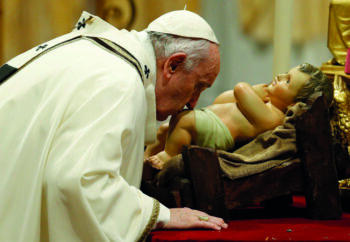Francis Speaks

Pope Francis kisses a figurine of the baby Jesus at the start of Christmas Eve Mass in St. Peter's Basilica at the Vatican Dec. 24, 2021. (CNS photo/Paul Haring)
Joseph and Mary went up “to the city of David called Bethlehem” (Lk 2:4).
Bethlehem: the name means ‘house of bread’. In this ‘house’, the Lord today wants to encounter all mankind. He knows that we need food to live. Yet he also knows that the nourishments of this world do not satisfy the heart. In Scripture, the original sin of humanity is associated precisely with taking food: our first parents “took of the fruit and ate”. Mankind became greedy and voracious. In our day, for many people, life’s meaning is found in having an excess of material objects. An insatiable greed marks all human history, even today, when, paradoxically, a few dine luxuriantly while all too many go without the daily bread needed to survive.
Bethlehem is the turning point that alters the course of history. There God, in the house of bread, is born in a manger. It is as if he wanted to say: “Here I am, as your food”. In Bethlehem, we discover that God does not take life, but gives it. The tiny body of the Child of Bethlehem speaks to us of a new way to live our lives: not by devouring and hoarding, but by sharing and giving. By feeding on him, the bread of life, we can be reborn in love, and break the spiral of grasping and greed. Standing before the manger, we understand that the food of life is not material riches but love, not gluttony but charity, not ostentation but simplicity.
The Lord knows that we need to be fed daily. That is why he offered himself to us every day of his life: from the manger in Bethlehem to the Upper Room in Jerusalem. Today too, on the altar, he becomes bread broken for us. At Christmas, we on earth receive Jesus, the bread from heaven. It is a bread that never grows stale, but enables us even now to have a foretaste of eternal life.
In Bethlehem, we discover that the life of God can enter into our hearts and dwell there. For once Jesus dwells in our heart, the centre of life is no longer my ravenous and selfish ego, but the One who is born and lives for love. Then, as we enter the stable, let us ask ourselves: Can I manage without all these unnecessary extras and live a life of greater simplicity? In Bethlehem, we see people who themselves had made a journey: Mary, Joseph and the shepherds. Jesus is bread for the journey. He does not like long, drawn-out meals, but bids us rise quickly from table in order to serve, like bread broken for others. Let us ask ourselves: At Christmas do I break my bread with those who have none?
After Bethlehem as the house of bread, let us reflect on Bethlehem as the city of David. There the young David was a shepherd, and as such was chosen by God to be the shepherd and leader of his people. At Christmas, in the city of David, it was the shepherds who welcomed Jesus into the world. On that night, the Gospel tells us, “they were filled with fear”, but the angel said to them “Be not afraid”. How many times do we hear this phrase in the Gospels: “Be not afraid”? It seems that God is constantly repeating it as he seeks us out. Because we, from the beginning, because of our sin, have been afraid of God; after sinning, Adam says: “I was afraid and so I hid”. Bethlehem is the remedy for this fear, because despite man’s repeated “no”, God constantly says “yes”. He will always be God-with-us. And lest his presence inspire fear, he makes himself a tender Child. Be not afraid: these words were not spoken to saints but to shepherds, simple people. The Son of David was born among shepherds in order to tell us that never again will anyone be alone and abandoned; we have a Shepherd who conquers our every fear and loves us all, without exception.
The shepherds of Bethlehem also tell us how to meet the Lord. They were keeping watch by night: they were not sleeping, but doing what Jesus often asks all of us to do, namely, be watchful. They remain alert and attentive in the darkness; and God’s light then “shone around them”. And after seeing Jesus, they go off to proclaim his birth, so that “all who heard were amazed at what the shepherds told them”
To keep watch, to set out, to risk, to recount the beauty: all these are acts of love. The Good Shepherd, who at Christmas comes to give his life to the sheep, will later, at Easter, ask Peter and, through him all of us, the ultimate question: “Do you love me?” We too are asked to respond to Jesus with the words: “I love you”. The answer given by each is essential for the whole flock.
“Let us go now to Bethlehem”. With these words, the shepherds set out. We too, Lord, want to go up to Bethlehem. I want to come to Bethlehem, Lord, because there you await me. I want to realise that you, lying in a manger, are the bread of my life. I need the tender fragrance of your love so that I, in turn, can be bread broken for the world. Take me upon your shoulders, Good Shepherd; loved by you, I will be able to love my brothers and sisters and to take them by the hand. Then it will be Christmas, when I can say to you: “Lord you know everything; you know that I love you”.
Solemnity of the Nativity of the Lord - Homily - Vatican Basilica, 24 December 2018
 Entries(RSS)
Entries(RSS)